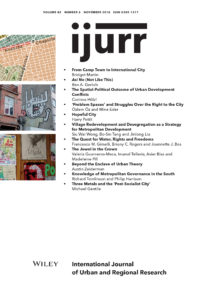This study addresses the spatial‐political impact and lasting emancipatory potential of urban development conflicts. It is based on a case from Santiago de Chile, where activists from different social backgrounds struggle against processes of gentrification and structural densification within the context of current urban planning measures. The (temporary) peak of the conflict constituted a referendum, by means of which the social movements were able to refuse a new land‐use plan. Theoretically, the article builds on the combination of radical democratic and spatial perspectives. A frame analysis serves to capture the spatial‐political approach for the empirical analysis. Findings reveal a range of emancipatory practices, such as counter‐hegemonic and self‐organized housing and planning policies. Furthermore, my research shows that maintaining agonistic spaces enables experimental social orderings that symbolize sustained contestations of neoliberal spatial policy.

